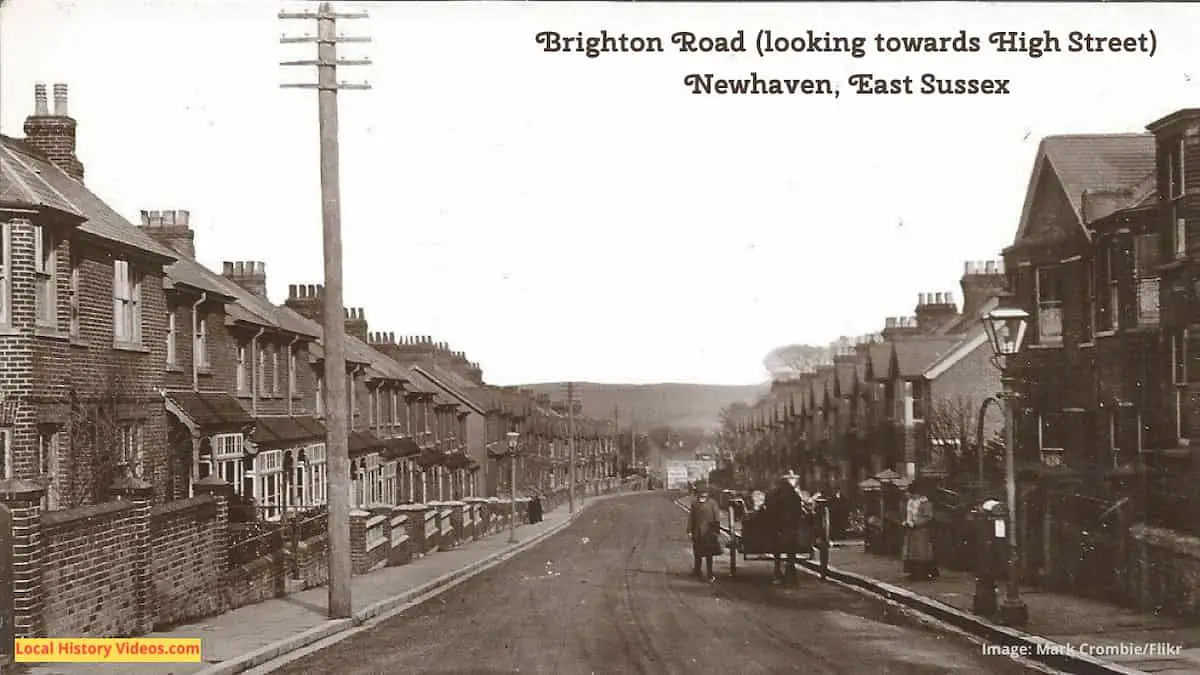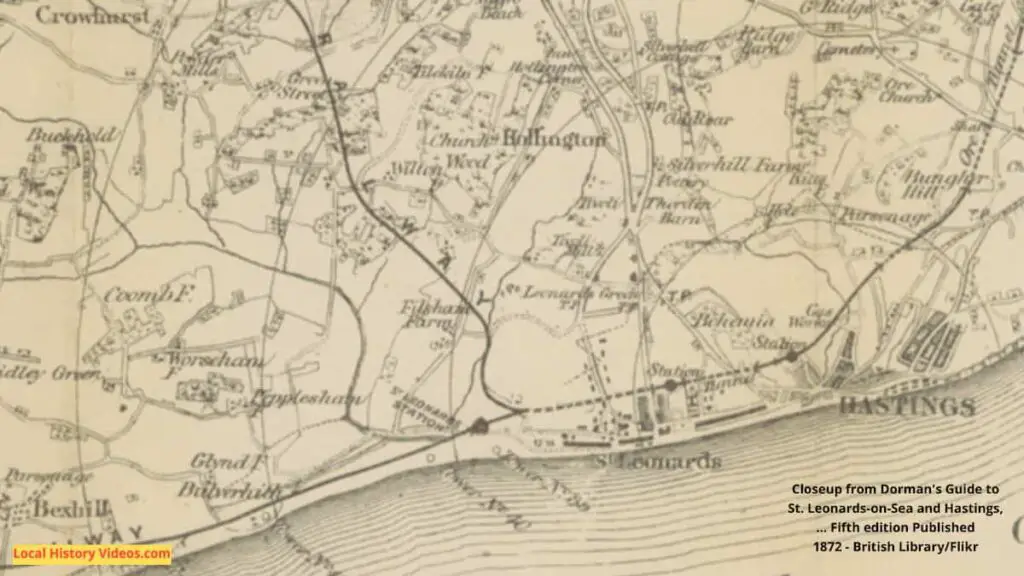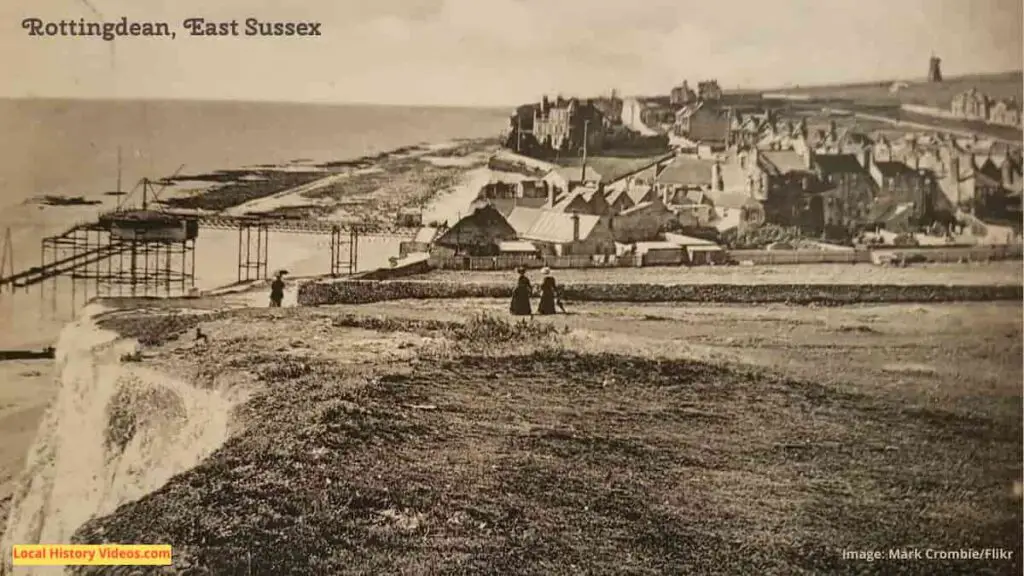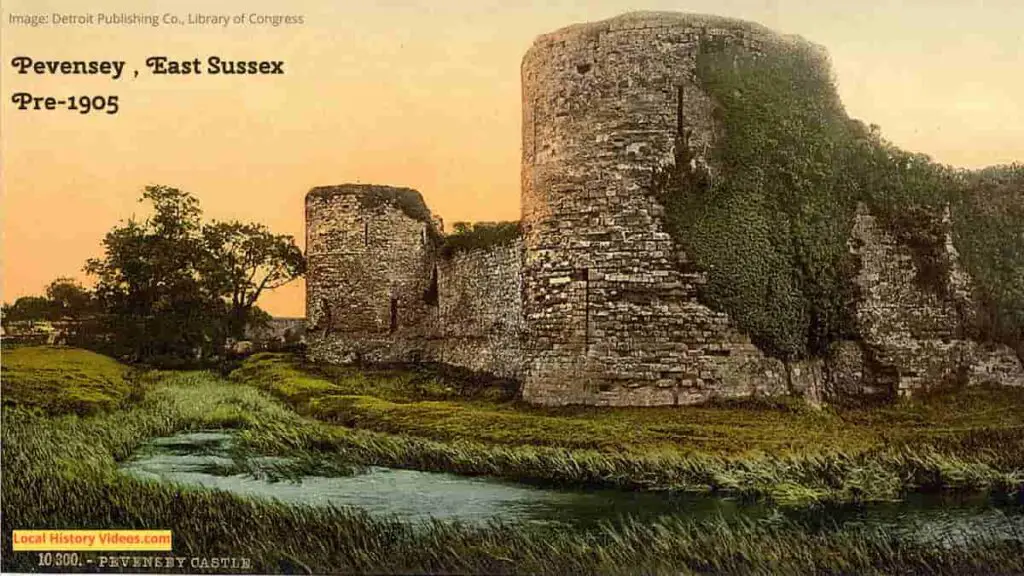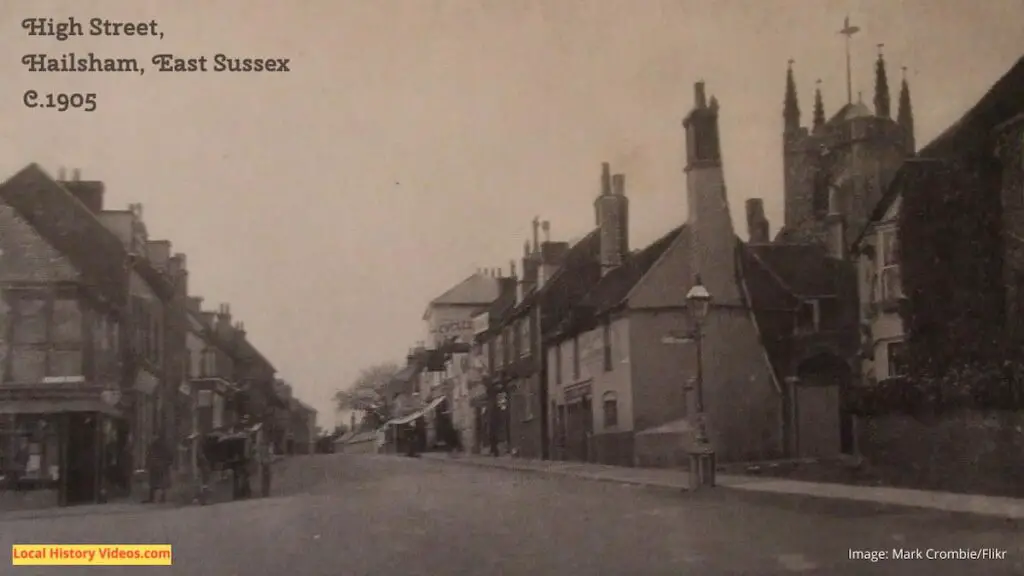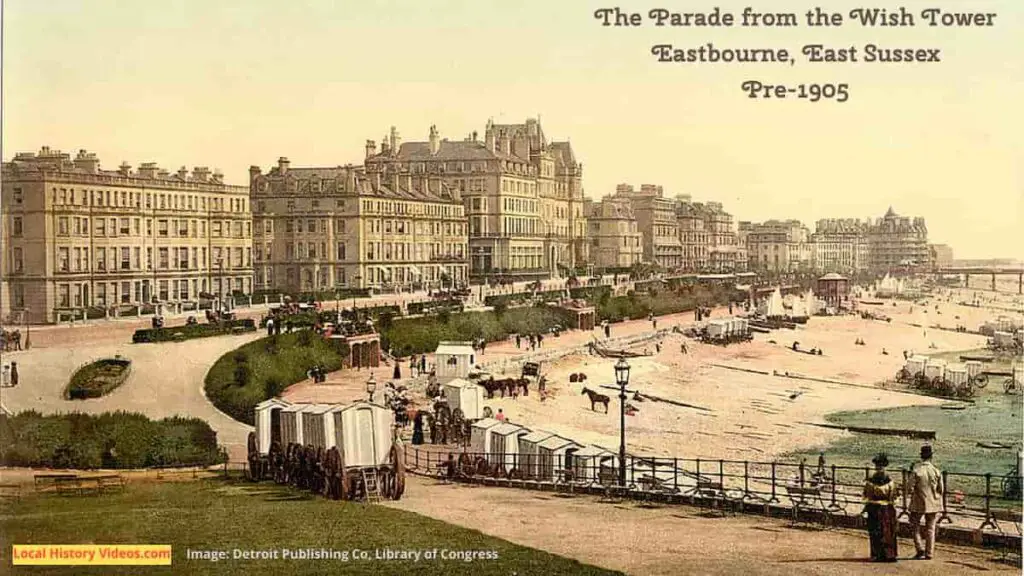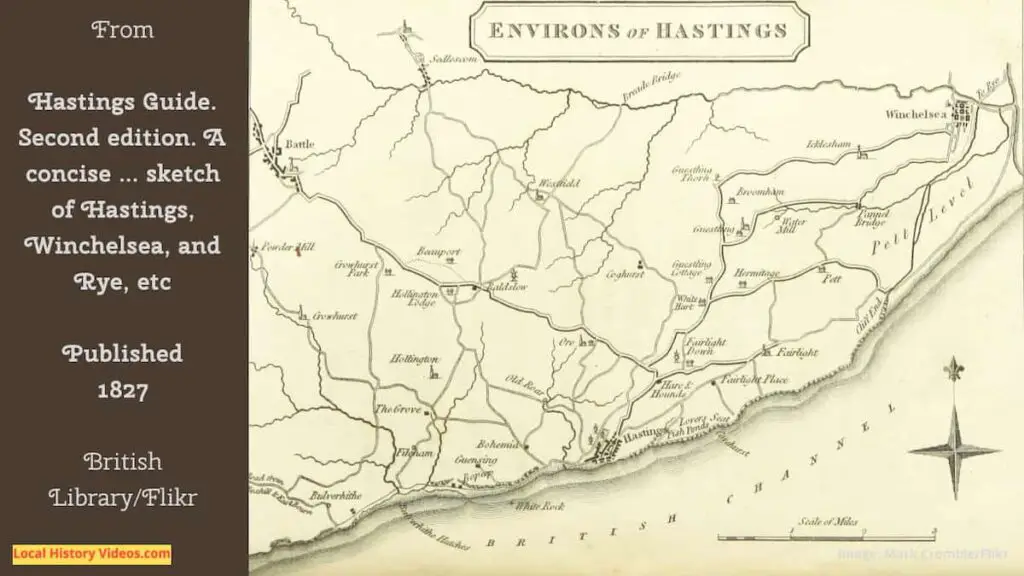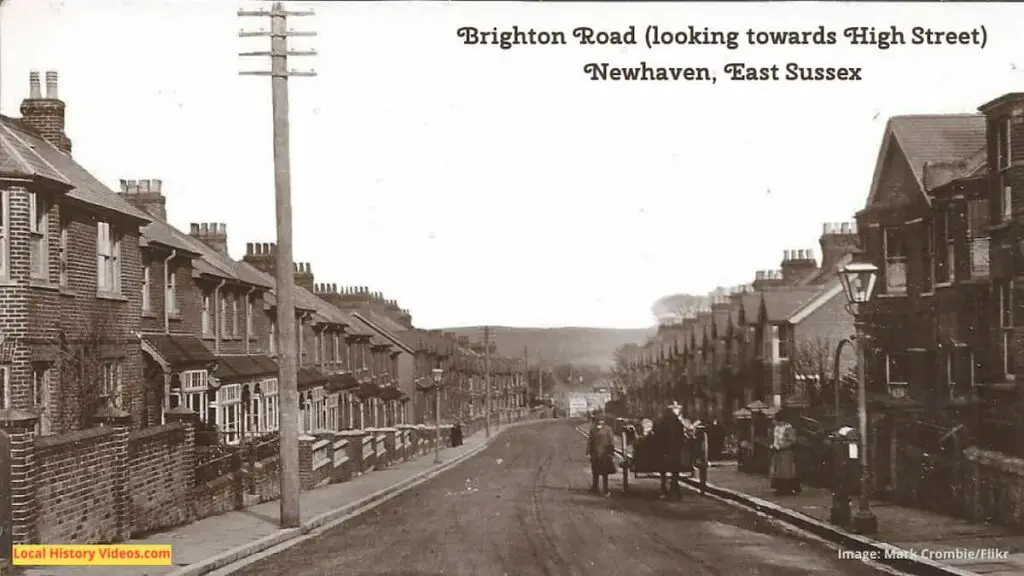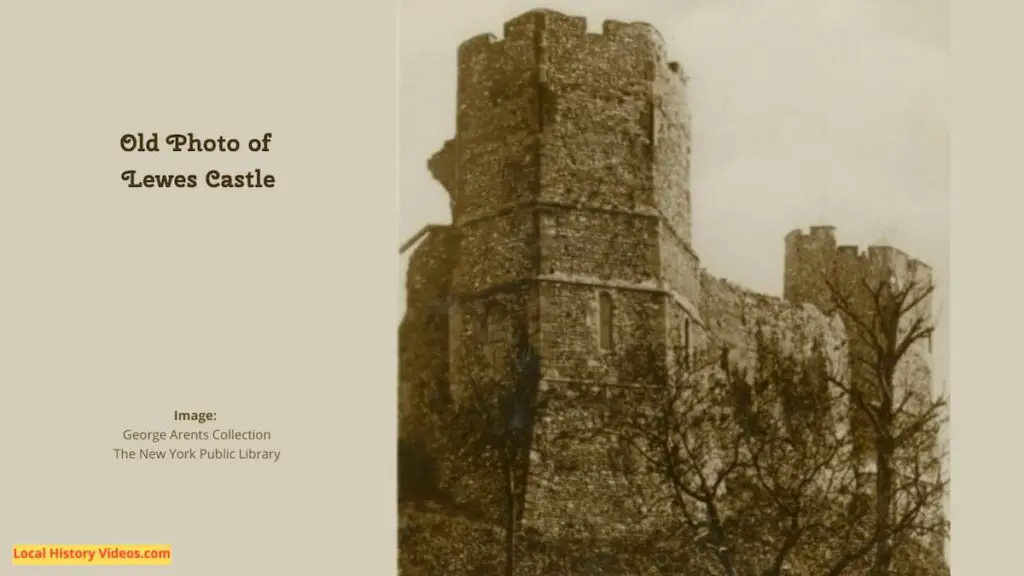Glimpse history through old images of Newhaven, East Sussex, England.
New Lifeboat 1931
In 1931, Newhaven’s new lifeboat, called the Cecil and Lillian Philpott, was launched by Prince George.
It was a motor lifeboat, so the crew would no longer have to work their way through stormy waters with oars.
Before this lifeboat was taken out of action in 1959, she had been launched locally 159 times and saved 99 lives.
In addition, she joined the fleet of little boats at the Dunkirk rescue in 1940, and was almost lost, but saved 51 soldiers.
The following November she narrowly survived after being rammed and nearly cut in half by HM trawler Avanturine.
Serving in the RNLI’s reserve fleet at various lifeboat stations around the coast between 1959 and 1969, the lifeboat responded to 76 incidents and saved a further 49 lives.
Amazingly, the vessel seen in this 1931 is still around. In 1969, Hertfordshire GP and self-taught expert on deer Dr. Oliver Dansie purchased the old lifeboat, renaming it the Stenoa. He died in 2014, and ownership has passed to his grandchildren.
Newhaven’s New Motor Lifeboat (1931) – British Pathé on YouTube
POW Exchange 1941
In 1941, Britain and Germany spent several weeks trying to negotiate an exchage of sick and wounded prisoners of war.
This footage shows the German POWs boarding ships at Newhaven (the Dinar and St Julian were apparently the ships involved in this exercise). It included men carried on board on a stretcher, or assisted by the Royal Army Medical Corps (RAMC) staff.
The POWs were supposed to sail to Dieppe for the exchange with British POWs.
But German haggling over numbers carried on for several days. So the POWs were led off the ship each day to get some exercise.
Unfortunately, it was all in vain, as the negotiations by radio communication eventually collapsed.
It’s interesting to hear the newsreel talk about the psycological toll on those involved as they waited on tenterhooks to be returned home.
Repatriation Hold Up (1941) – British Pathé on YouTube
Golden Jubilee of the Bentley 1969
W.O Bently founded his company on 18th January 1919, and released the first car in 1921.
To celebrate the company’s 50th anniversary, a large collection of old Bentley cars came down to Newhaven, ready to catch the ferry for their trip to Le Mans where Bentleys had achieved great racing success in the 1920s and 1930s.
There were 70 cars in total, nearly all of them vintage models.
Old Bentleys (1969)- British Pathé on YouTube
Light Tower 1969
The first stage of the Soverign Light Tower, replacing the Royal Soverign Light Ship a few miles out of Beachy Head, git underway in 1969.
Nearly as tall as Nelson’s column, the 5,000 tonne concrete structure had two parts, and was slowly towed out from the beach to its permanent location.
The second stage would involve towing the cabin and lantern house, with helicopted landing pad, out to the base.
The project was budgeted at £500,000.
Light Tower (1969) – British Pathé on YouTube
A Bit of Newhaven History
Extract from:
Original sketches, etc., for the improvement of Newhaven Harbour, etc. [With two plates.]
by F. FORTUNE (of the Newhaven Harbour Office.)
Published in 1825
Pages 11- 13
Copy of intended Petition , by J. B. STONE , Esq .
To the Right Honorable the Earl of Egremont, the Earl of Chichester, Lord Sheffield, Lord Colchester, Lord Gage, Lord Hampden, Walter Burrel, Esq. and E. J. Curties, Esq. Representatives in Parliament for the County of Sussex; Sir J.
Shelley and George Shiffner, Esq. Members for Lewes; Lord Bury and Thomas Read Kemp, Esq. Members for Arundel; Hon. G. J. W. Ellis and George Rose Ellis, Esq. Members for Seaford; and Sir G. Warrender, Bart. and H. Benhan, Esq. Members for Sandwich.
My Lords and Gentlemen ,
HAVING long viewed with regret the great calamities experienced on that part of the coast adjacent to the Port of Newhaven, in the County of Sussex, by frequent captures in the time of war, and continual shipwreck within the limits of the said Port.
We feel it a duty we owe to the Commercial World, the Merchant, Ship Owner, Underwriter, the Mariner and the Nation, to represent that the situation of the Port of Newhaven is in our humble opinion a matter well worthy your serious consideration: its situation with the Capital by land; with Portsmouth and the Downs by sea, is in our estimation worthy of notice, it is nearly the center between the Downs and Portsmouth, and the nearest Sea Port to the Capital of France, and also to the Capital of England; it is calculated to afford a most advantageous rendezvous to shipping passing down Channel when overtaken by adverse winds, there being no other place on the coast so calculated between the Downs and Portsmouth, and many of the calamities so often experienced are in a great measure owing to the want of such rendezvous and shelter.
In time of war it has daily occurred in West and South West Winds that French Privateers have hovered within a mile of our shores, and captured ships before our eyes, without the least means presenting itself to prevent the same; the English Cruizers being blown from their stations, and forced for shelter under Dungeness, or in the Downs, thereby leaving the coast wholly unguarded, being unable to keep their stations, having no nearer shelter or place of safety to run for…
We are of opinion that the anchorage in Seaford Roads (within three miles of the Pier Heads of the Port of Newhaven) in Easterly winds is particularly good, being constantly frequented by fleets of ships; but which Roadstead has no protection for shipping in West and South West winds, the want of which is too often experienced, we feel it our duty therefore to state that it appears to us that such shelter could be given in West and South West winds, by forming a Breakwater to the Westward of Newhaven Harbour, and extending the present Piers to low water mark; the place appears formed by nature for the undertaking suggested, the principal part of the materials are on the spot, which would ease the expense of carrying so desirable a work into execution; we feel also persuaded that the expense of the proposed improvement would be no consideration to the magnitude of the benefits that would arise therefrom, and that the shipping in general would cheerfully contribute by the payment of a trifling Duty to assist in such benefits that they would receive.
The articles most required for the Breakwater could be had from the adjoining cliffs; blowing the cliffs would give chalk and stone of immense weight, which as a foundation, appears to us equal to any other material that could be used; however, these points we would leave for the judgment of abler men.
We have frequently observed large fleets of ships from the Downs, bound to the West-Indies, Portugal, Ireland, Portsmouth, Plymouth, Liverpool, Falmouth, and other Ports, make their passage as far as off the Port of Newhaven, Brighthelmstone, and even Little-hampton, the latter place thirty miles West of Newhaven, but from a sudden change of wind to the South West or Westerly, the whole have been compelled to bear up for the Downs or Dungeness, having no nearer shelter; many of which have been captured, others injured by the storm, or shipwrecked, but had there been a place of shelter or rendezvous at the Port of Newhaven, many of those disasters would have been avoided, as it is the material distance between the Port of Newhaven and the Downs, that leaves the opening for danger, as ships have a distance of one hundred miles to run for shelter, whereas if a rendezvous could be obtained at Newhaven, those increased risks would be avoided.
We presume to submit that an Improvement at Newhaven would, in time of war, be attended with NATIONAL ADVANTAGE, by the facility it would afford to the embarking of Troops.
Sussex being an extensive Depôt for Troops, which have hitherto been marched for embarkation from Lewes, Brighthelmstone, Hailsham, Blatchington, and Eastbourne, to the Ports of Dover or Ramsgate, the nearest of which Ports from the Depôts before mentioned, is not less than seventy miles, whereas the Port of Newhaven does not exceed fourteen; by such embarkation being effected at the Port of Newhaven, a considerable expense would be saved to the Country, and much fatigue and loss of time to the Army.
We beg also to suggest that great facility in time of war could be given to Government in the victualling and storing ships of war, which upon the principle hitherto adopted, must have been attended with continual inconvenience; for want of a rendezvous at Newhaven, ships of war when in need of stores, have necessarily been obliged to proceed to Dover or Portsmouth, to obtain their supplies, consequently compelled to leave their stations, this would by the improvement suggested be prevented, and add much to the security of the coast.
From the continual remarks of the ship owner, and master, we are satisfied the wishes of them would be signified, by their signatures to a Memorial to a very great extent, if necessary, particularly those in the Coal and West Country Trade, & c.
We should beg to observe, there has been several Surveys and Reports highly favorable to the forming a convenient Harbour at Newhaven, particularly two within a few years, by Lieutenant MURRAY, Naval Engineer, and Mr RENNIE.
The Survey and Report of the latter proposes a very extensive plan, the expense of which perhaps would be objectionable, but a very essential part of it, viz.
The construction of Piers with stone, chalk, and such materials, and the extension of them to low water mark, with a proper Breakwater, might be executed at a moderate expense.
And it may be further observed, that Newhaven has nautical advantages superior to those on the opposite coast of France and Flanders, with the advantage of a bold shore, instead of a flat one with pregnant shoals, as is the case of the opposite coast.
The many advantages that present themselves both to Commerce and the Nation induce us, from a sense of duty, to solicit your interference to further so important and desirable an undertaking.
We flatter ourselves that, by your kind support in representing the subject to the Lords of the Treasury and the Lords of the Admiralty, the observations herein contained will merit their Lordships’ serious attention. The services you may render to cause the execution of a Work affording great advantages to trade and benefit to the neighboring coast, and so important to every individual that risks his property on the ocean, would forever remain in their recollection with gratitude and esteem.
We have the honor to remain ,
MY LORDS AND GENTLEMEN ,
Your obedient and faithful Servants
More about East Sussex
- Old Images of Wannock, East Sussex
- Old Images of St Leonards-on-Sea, East Sussex
- Old Images of Crowhurst, East Sussex
- Old Images of Rottingdean, East Sussex
- Old Images of Pevensey, East Sussex
- Old Images of Hailsham, East Sussex
- Old Images of East Sussex, England
- Old Images of Winchelsea, East Sussex
- Old Images of Newhaven, East Sussex
- Old Images of Lewes, East Sussex

